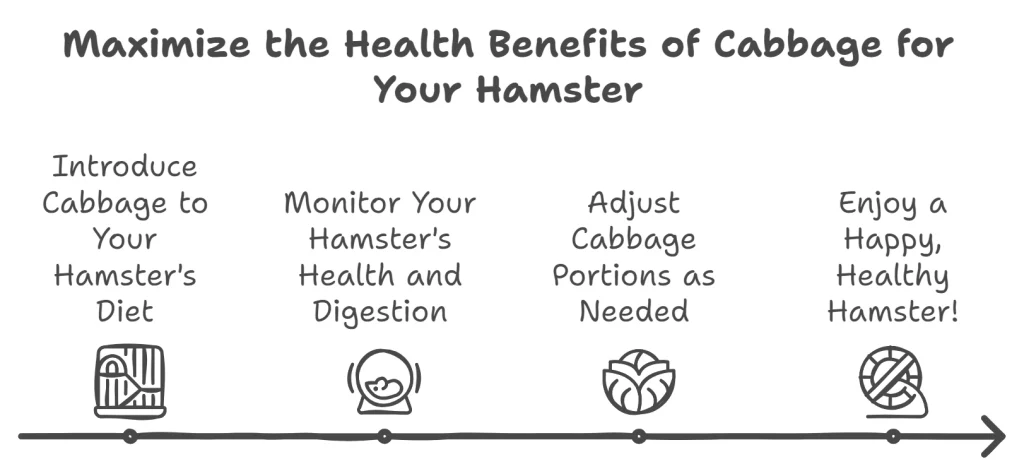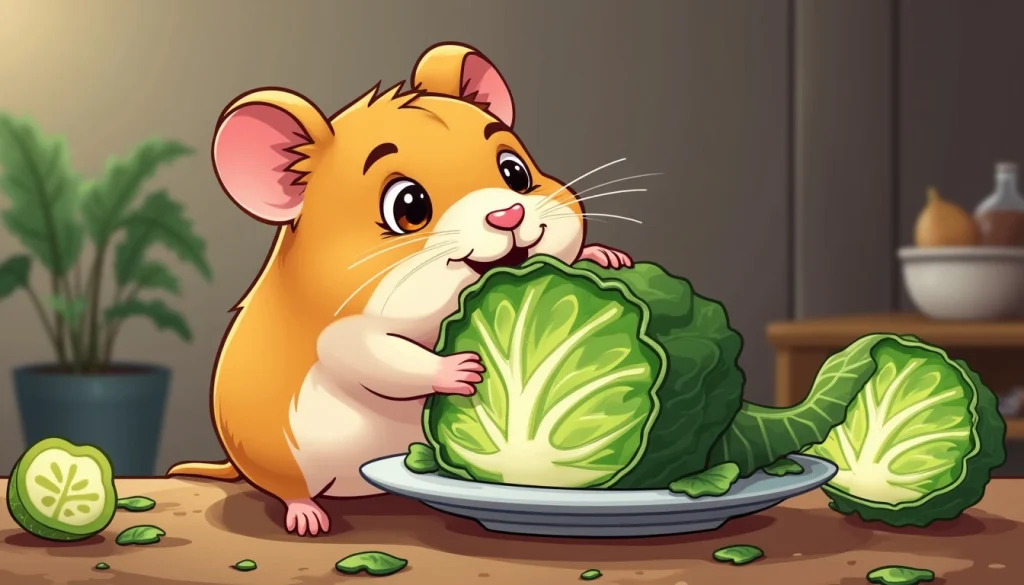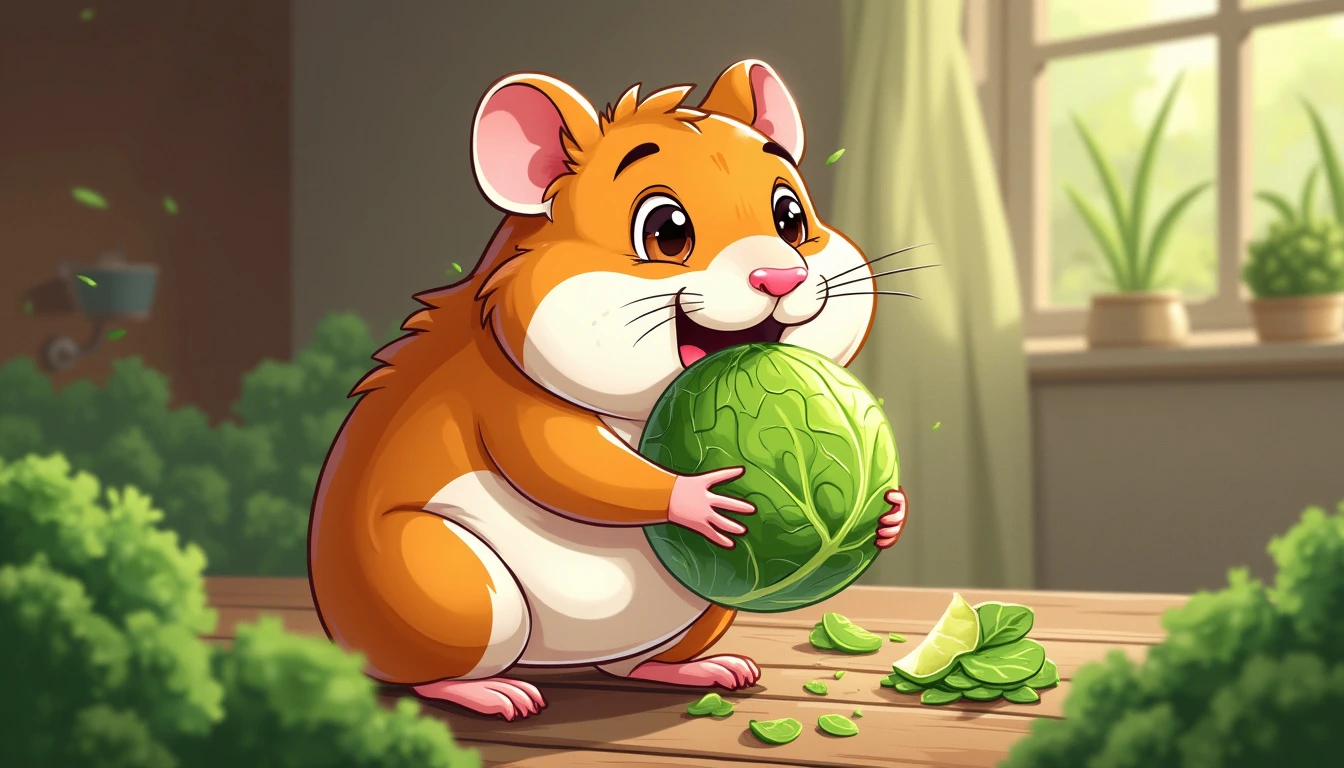If you’re a proud hamster owner, you’ve probably wondered at some point, Can my hamster eat cabbage? The short answer is yes, but with a few important caveats. While cabbage is not toxic to hamsters, the key is moderation. Knowing which foods are safe for your furry friend—and how much of them they can consume—is crucial to ensuring they live a long, healthy life. Overfeeding even healthy foods like cabbage can lead to digestive issues or other health problems, so it’s essential to find the right balance.
1. Nutritional Benefits of Cabbage for Hamsters

Cabbage is packed with several nutrients that can be beneficial to hamsters when given in small amounts. Let’s break down the key components:
Vitamins
Cabbage is rich in vitamins C and K, both of which play critical roles in your hamster’s overall well-being. Vitamin C helps maintain their immune system, warding off illnesses, while vitamin K is vital for bone metabolism and supports proper blood clotting. These vitamins are essential for keeping your hamster active and healthy.
Minerals
One of the standout minerals in cabbage is calcium, which contributes to strong bones and teeth. However, while calcium is necessary for bone health, too much of it can lead to issues like kidney stones, so it’s important to keep the portions in check.
Fiber
Cabbage also provides a healthy dose of dietary fiber, which aids digestion and promotes regular bowel movements. Fiber is particularly helpful in maintaining a hamster’s sensitive digestive system, but again, moderation is key to avoiding any gastrointestinal discomfort.
2. Potential Risks of Feeding Cabbage to Hamsters
While cabbage has its nutritional perks, it also comes with potential risks when not fed in moderation.
Digestive Issues
Hamsters have sensitive digestive systems, and feeding them too much cabbage can lead to unpleasant side effects. The high fiber content in cabbage, while beneficial in small amounts, can cause gastrointestinal problems such as bloating, gas, and diarrhea if overconsumed. These digestive issues can leave your hamster feeling uncomfortable or even ill, so it’s important to control the portions.
Dehydration
Cabbage has diuretic properties, meaning it can increase urination. This might sound harmless, but without enough water to balance this effect, your hamster could face dehydration. Dehydration can cause lethargy and other health complications, making it crucial to monitor both the cabbage intake and your hamster’s water supply.
Calcium Overload
Calcium is essential for strong bones, but too much of a good thing can turn harmful. Excessive calcium intake from foods like cabbage can lead to the formation of kidney stones in hamsters. These stones can cause pain and urinary issues, so keeping calcium levels in check by limiting cabbage intake is vital to your hamster’s long-term health.
3. Recommended Feeding Guidelines for Cabbage

When feeding cabbage to your hamster, following the correct portion and frequency guidelines can help avoid the risks.
Portion Size
The ideal portion size for cabbage is small—about half a teaspoon of shredded cabbage at a time. This tiny amount is enough to provide the nutritional benefits without overwhelming your hamster’s digestive system or causing any of the aforementioned issues. A small portion also helps you monitor their reaction to this new food.
Frequency
Cabbage should only be offered as an occasional treat. Feeding cabbage 1-2 times a week is sufficient to add variety to your hamster’s diet without overloading their system with fiber or calcium. This frequency ensures they enjoy the benefits without the risks associated with too much cabbage.
Preparation Tips
Before offering cabbage to your hamster, always wash it thoroughly to remove any pesticides or chemicals that might be harmful. After washing, shred the cabbage into small, bite-sized pieces to make it easier for your hamster to eat and digest. Avoid giving your hamster whole or large chunks, as these can be difficult for them to manage and may pose a choking hazard.
4. Conclusion
In conclusion, hamsters can safely enjoy cabbage as an occasional treat, but moderation is key. While cabbage offers nutritional benefits like vitamins, minerals, and fiber, it must be balanced with the potential risks such as digestive issues, dehydration, and calcium overload. To ensure your hamster stays healthy, always follow recommended portion sizes and limit their cabbage intake to 1-2 times per week.

